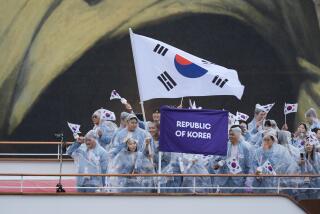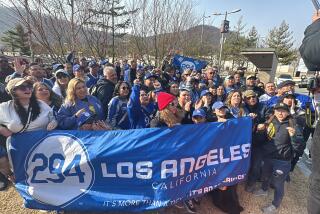Team Passes Winning Spirit to S. Koreans
SEOUL — SEOUL -- Prevailing against some of the world’s biggest soccer powers has had a near-magical effect on confidence in South Korea as regional, political and social divisions have melted away, at least for the time being.
By beating Spain on Saturday, South Korea became the first Asian team to reach the semifinals of the prestigious World Cup. But the road that got it there has taken on far more significance than just a string of sports victories.
“Now people believe they can do anything,” said Lew Seok Choon, sociology professor at Yonsei University. “It’s a real recognition on the global stage of all that Korea has achieved.”
A win today against Germany would put the team in the finals this weekend and deliver fans of the “Red Devils” very close to soccer heaven. Even if their team loses, most South Koreans say they feel blessed.
“This is beyond our wildest dreams,” said Jun Sun Ju, a 25-year-old company worker. “Korea will never be the same.”
At each successful stage, millions of fans have poured into the streets decked in the team’s trademark red to dance, yell and hug to the chants of “Dae Han Min Guk,” or Great Republic of Korea.
Soccer mania has interrupted funerals and weddings and diverted Buddhist monks from prayer amid reports that the roar of the crowd in Seoul Plaza hit 104 decibels, the equivalent of a jet taking off.
Most demonstrations in South Korea until relatively recently tended to be pitched street battles as citizens dodged tear gas canisters to protest the tyranny of their government. Red was often associated with the evils of communism.
“The rallies show how people’s consciousness and cooperative spirit have really been elevated by democracy,” said Kim Ki In, a 71-year-old retired teacher. “And as far as red goes, I was raised to hate the color. Now to see the whole country in red is unbelievable.”
The assemblies, involving up to 6 million people watching the games in plazas nationwide, have been blessedly free of vandalism, crime or the violence long associated with soccer in Europe and Latin America. Even police officers have joined the party, keeping people in line with the rhythmic whistles of the team’s fight song.
If anything, soccer mania seems to have dampened trouble. Divorces and petty crime have dropped since the team started winning, and there are claims that wives are getting along better with their mothers-in-law, a traditional bugaboo in close-knit South Korean families.
It hasn’t been completely trouble-free. Two people died of heart attacks after getting too excited while watching televised games. A couple of teenagers died when a truckload of fans crashed. And one man was hospitalized with a sprained wrist from clapping.
Not surprisingly, South Korea’s winning ways have dominated newspaper front pages with headlines such as “Glory, Glory Korea.” The soccer hoopla has become a staple of TV variety shows and even cooking programs.
An added confidence booster for many South Koreans is the fact that co-host Japan--an economic rival with nearly three times the population of South Korea, and which occupied the peninsula from 1910 to 1945--hasn’t done nearly as well, although it still put up a good fight.
The South Korean government had hopes of using the games as a friendship bridge with North Korea. It invited its quirky neighbor to host some of the games and to attend the Seoul welcoming ceremonies as an observer. In classic form, Pyongyang never responded.
South Koreans were heartened to hear that North Korean guards cheered for the South when games were broadcast on propaganda loudspeakers across the demilitarized zone. North Korean defectors arriving here Monday also charmed their new country by announcing that one of their greatest pleasures would be to watch the South Korean team win.
The games have also made a hero--some might even say a saint--out of Guus Hiddink, the South Korean team’s Dutch coach. The former leader of the Netherlands national squad has been widely praised for his ability to bring out the best in the South Korean soccer players. The team has now cut its odds of winning the final to 1 in 6 from the 1-in-151 chance it was assigned at the start of the tournament.
There’s talk of erecting Hiddink statues, renaming streets after the coach and making him an honorary citizen. Internet chat rooms beg him to become a South Korean, and adoring fans have nicknamed him Hee Dong Gyu, or “Blissful Eastern Star.”
On Web sites, Hiddink has even been accused, tongue in cheek, of crimes against South Korea: He’s made the population so excited, it’s lost sleep. He’s hurt business by driving restaurants to give away free food in celebration. And his victories have released so many endorphins in the population that the medical business is suffering.
As an outsider in a nation where school ties, regional connections and political affiliation carry enormous sway, Hiddink was able to cut through the favoritism and pick a team solely on merit.
During 18 months of intense training, his open, down-to-earth approach and ruthless insistence on global standards are now openly seen as a model for South Korean business, politics and society.
“I wonder if our politics could also become among the eight strongest in the world,” said ruling party presidential candidate Roh Mu Hyun.
Although most South Koreans doubt that will happen anytime soon given a string of recent scandals, the show of national unity during the games has raised hope that the country can move beyond the deep-seated regional rivalries that have divided it for so long.
Thomas Kluck, a commerce official at the Netherlands Embassy, says the wealth of good feeling that Hiddink has engendered far outstrips decades of marketing budgets by his government. “Suddenly everything from the Netherlands is good,” he said.
There are limits, however. “I don’t expect Koreans to all start wearing wooden shoes, although maybe a few will do so during the rainy season,” said Lee Sung Jae, a fabric company president.
Chi Jung Nam in The Times’ Seoul Bureau contributed to this report.






